Ghadir Naqqali Festival to kick off in Tehran with focus on innovation, education

TEHRAN- The 6th edition of Ghadir Naqqali Festival will be held in Tehran from June 21 to 24, marking the occasion of Eid al-Ghadir, the organizers have announced.
This year's festival will focus on research and education, with a new section dedicated to seminary students, Hossein Taheri, one of the secretaries of the event said during a press conference held in Tehran on Tuesday.
The festival has seen a significant increase in the number of participants, particularly in the children and youth sections, featuring a wide range of ages and genres, showcasing the versatility and creativity of Iran's young artists. The festival will also feature a scientific section focusing on storytelling and scriptwriting, emphasizing the importance of research to avoid mistakes and errors in this field.
This section will provide a platform for researchers and scholars to share their findings and expertise on the art of naqqali and pardeh-khani, he noted.
Regarding the need for research in this field, Mohammad Javad Jalali, the scientific secretary of the festival, emphasized that research is essential to avoid mistakes and errors. He also stressed the importance of preserving the cultural heritage of Iranian dramatic arts.
In addition to the scientific section, the festival will include four specialized sessions and two workshops with experienced professors. These sessions will cover topics such as the history and evolution of naqqali, scriptwriting techniques, and the role of naqqali in Iranian culture.
The festival will also feature a special section dedicated to traditional performances such as tazieh and pardeh-khani, which have been neglected in recent years. These performances are an important part of Iran's cultural heritage, and it is essential that they are preserved and promoted for future generations.
"We want to revive these traditional performances and encourage young people to learn about them," said Jalali. "These performances are an important part of our cultural identity, and we need to preserve them."
The festival will also establish an international network of artists and will be held internationally next year. This move is aimed at promoting naqqali and pardeh-khani globally, and providing a platform for artists from around the world to showcase their talents.
Furthermore, the festival plans to encourage students to conduct research and write articles on naqqali and pardeh-khani. This new section will provide a platform for young researchers to share their findings and contribute to the preservation of Iran's cultural heritage.
Iran's Art Bureau of the Islamic Ideology Dissemination Organization will be hosting this edition of the festival.
Naqqali is the oldest form of dramatic performance in Iran and has long played an important role in society, according to the UN cultural body.
The performer or the naqqal recounts stories in verse or prose accompanied by gestures and movements, and sometimes instrumental music and painted scrolls. Naqqals function both as entertainers and as bearers of Persian literature and culture and need to be acquainted with local cultural expressions, languages and dialects, and traditional music.
Naqqali requires considerable talent, a retentive memory, and the ability to improvise with the skill to captivate an audience.
Naqqali was formerly performed in coffeehouses, tents of nomads, houses, and historical venues such as ancient caravanserais. However, a decline in the popularity of coffeehouses, combined with new forms of entertainment, has resulted in diminishing interest in naqqali performance.
SAB/
Leave a Comment